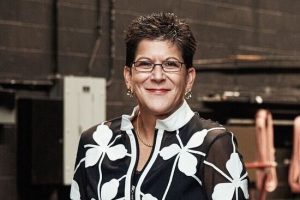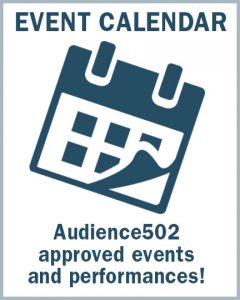On a normal year, Broadway Across America produces thousands of performances across the country and the world. This year, there have been none since April. That being said, Broadway’s creative aspirations and dedication to the stage has not waned at all. Just like the rest of us, the actors, actresses, producers, directors, staff, and volunteers at Broadway and all of our performing arts groups are anxiously waiting for the stages to shine bright once again.
Audience publisher, G. Douglas Dreisbach, caught up with the President of Broadway Across America’s Midwest Division, Leslie Broecker, to talk about how the organization is dealing with the challenges of the last nine months, how the team has adjusted, and what the future might hold.
Listen to the full interview for free below.
G. Douglas Dreisbach: It is always a pleasure to get to talk to you and hear about everything going on at Broadway in Louisville and beyond. You have certainly had your hands full since we last spoke in April.
Leslie Broecker: No question about it, it has been very interesting. When we closed our offices back in March and Broadway dimmed its lights, we never could have imagined that it would be the end of the year without a show. We started rebooking shows into the summer, thinking this would all be behind us, but it wasn’t. Hopefully it will be soon, though.
GDD: Broadway is a little different than the other groups in town because your actors and production crews are located around the country, managed, and directed from New York. What is different from the way you produce shows, versus local groups?
LB: Well, a big touring Broadway show that comes to Louisville is reliant on the rest of the country to be able to support it, as well. What that means is, they need a contiguous route to be able to get through the country for the show to be profitable and to be able to stay on the road. So, for Louisville to host a show, we need other cities nearby, and all the way coast to coast, to also be able to host that show and fill week after week to be able to get the show on the road.
GDD: This year, so far, you have rescheduled the season three times, which is extremely difficult because of continuous routes you mentioned. After three times, is the planning process getting easier?
LB: Every time you look at a theater calendar and try to match that up with a show route or multiple show routes, you’re playing dominoes. So, I need to line up with other markets. It doesn’t necessarily get any easier, because the producers have never done this before, and if you had a show that was out on the road at the time everything shut down in March, you’re in a very different place than you are if you’re a producer who’s getting ready to launch, say, a new tour this past fall.
The guy that’s got a show on the road has parts and pieces that he needs to decide where they live during this time, and a cast that has to get home. So that is very different than a show that was maybe going to start up brand new on our season in the fall, and it has not been cast, and there weren’t set pieces and things like that.
So, each producer of a tour is going through something different from another, and some of the bigger tour companies are faced with maybe launching multiple tours. For example, there are four productions of Hamilton in the United States, and so to relaunch four shows at the same time is not something they would have done before. So, it’s all new, but it’s exciting. And we are so excited to be able to come back.
GDD: When that day comes, what do you think the community will feel like when those shows get announced and the curtain rises again?
LB: When that day comes, and we are in the theater, I can promise you I am going to cry. Our subscription base has stuck with us through all of this. They know to basically just keep rolling forward, and their passion for Broadway has not dimmed. They just want to be able to come to the theater and feel safe. The Kentucky Center is going through all kinds of things in regards to improved air circulation, and things that will make people feel safe and within the federal and state guidelines.
People are so hungry for live theater and all of the things the theater gives to them. So, I think the reaction and the seasons are going to be great.
GDD: What are the metrics for a Broadway show in Louisville to be profitable? What are some of the indicators for that?
LB: Whitney Hall holds about 2,400 people, so basically, what that means is, we need to be able to go at full capacity. Our economic model for Broadway is as tough as it comes. It’s a risky, risky business, and everything we’ve done so far has been built on that model, and so that’s what we’re waiting for.
GDD: Do you think there will ever be a time when live events will ever return to the way they were prior to the pandemic?
LB: I think we will get back to it. As science has shown us, and it has been a miracle how fast they’ve been able to put together a vaccine, but as more people have access to the vaccine and immunity begins, we will squeeze this thing out, we’ll get there, it is just going to take some time.
Everyone is going to have their own comfort levels. I think we, as presenters and as theater managers, will have an obligation to make people not only feel safe, but be safe ourselves.
I don’t think it’s going to come back overnight. It is going to take time, but I definitely think we will eventually all be back enjoying theater like we have in the past.
GDD: One of the exciting things that has taken place in the arts are the streaming digital productions. Do you see those sticking around, possibly offering the option to watch Hamilton live at Whitney Hall, or stream the performance from home?
LB: I think the current streaming opportunities will stay. I certainly think it’s been great to get larger exposure for the arts, and it is more affordable than sometimes coming to the actual theater. So, to be able to watch Hamilton being streamed this past summer was terrific and it feeds that desire to see the live, so we do love it and think it’s a great opportunity.
I don’t think that I would ever be streaming out from the theater. It’s kind of cool, though, what you mentioned, having it here and broadcasting it. I think there are just so many layers there to navigate through. So, we hope people will come to the theater.
GDD: Have you seen any strengths or new positives coming out from your team or Broadway and the arts as a whole? Is there any silver lining to all of this?
LB: It has been very emotional for all of us who work in this business. We were always very close-knit in our community, and I think I’ve seen it all come even more close together through this. The Broadway League, which is our trade association, put together — I kid you not — 36 task forces to be able to address all of the various things that we need to address. Everything from backstage to the front of house to actors to people who haven’t worked since March and need money — you name it, we covered it.
So, I think that has been one of the good things. It has certainly been so frustrating not to be able to be in the theater, but if you look hard and you work hard with your team, you’ll find the good in this. And can you imagine what the first performance back is going to be like? I can’t even imagine being in Whitney Hall, and the raucous noise and applause. It will all be worth it, I promise you that.
GDD: As we move forward into the new year, have your goals or outlook changed now that we are nine months into this?
LB: We are looking at the new year as turning the page on a rotten 2020. I would like to say that our season ticketholders are amazing. They have stuck with us, and we’ve had minimal refund requests. Everybody knows we are working hard to get the shows back into The Kentucky Center, and as soon as we can, and they are going to be there, and we can’t wait to see them.









